Do You Need A Masters To Get A Phd?


The answer to the question; Do You Need A Masters To Get A Phd? is strictly no’ for the students opting for Ph.D. in the United States, but it may vary in Europe or different parts of the world.
In the United States, A degree in master’s is not needed if you want to be admitted to Ph.D. And admission to Ph.D. can be taken in different ways.
Now, which method of getting a Ph.D. should one follow? There are two ways of getting a Ph.D. :
- Get a master’s degree first and then opt for a Ph.D
- Apply for Ph.D. directly after your bachelor’s.
Both the methods have their pros and cons. The details of both the ways that you should know are mentioned below.
Recommended:
Pursuing Ph.D. Without A Master’s Degree
The first method of getting a Ph.D. is getting it without a Master’s Degree. If you seek admission in the United States, then in most fields of Ph.D., a Master’s degree is not mandatory. You can get access to a Ph.D. program right after graduation without a master’s.
The trend of getting a Ph.D. is also rising in Canada. But a few people are still getting a Ph.D. after earning a master’s degree. Some students in Canada that are hardworking and bright students who have started a Master’s Degree can convert or transfer it to a Ph.D. degree, and they don’t have to complete the requirements of the Master’s Degree.
Upsides Of Getting Straight To PhD
Time-Saving
Starting a Ph.D. right after graduation is the wiser option. Because if a student completes a Master’s of almost two years and then applies for a Ph.D. program that will take nearly 5 to 7 years, a lot of time is wasted.
Sometimes, students of masters repeat some of their courses in Ph.D. But in case you start your Ph.D. right after your graduation, a lot of time will be saved from your effort.
Fundings Opportunities
One of the best benefits of a direct Ph.D. program is funding. Direct Ph.D. students get lots of privileges. Some of the Ph.D. programs offer full or half scholarships to the students, and some provide a yearly or monthly stipend.
These students also get other scholarships and sponsorships organized by an external funding organizer. So it’s a win-win situation, especially in these expensive times.
Enough Time For Lengthy Projects
Sometimes, it gets difficult for the students of masters to carry on lengthy projects in a shorter duration of time. Master’s students have a short time in which they have to achieve all the required things.
While Ph.D. students have enough time to carry on lengthy and detailed projects, they can also spend a few years on them. By doing so, their research work gets refined and polished.
Achieve More In Less
Those students who know their niche and the details about the research they want to do, don’t waste their time by pursuing a Master’s degree first. They can do so by following a Ph.D. degree.
So, why waste time on a Master’s when you can achieve more in less time by starting a Ph.D. program.
Time To Decide Career
After you graduate from college, you will have plenty of time to decide which career path you want to pursue. Since you will have the time to do so, you can experiment with other career paths.
Multiple Degrees At a Time
A student can get a Master’s degree while doing a Ph.D. It can be done when the student has achieved specific requirements and after completing the course. In short, a Ph.D. offers the chance for another degree while you are already doing a Ph.D.
Downsides Of Getting Straight To PhD
Degree Withdrawal
Whenever a student converts or transfers from one degree to another, the student withdraws from the 1st degree. According to the terms and conditions of the program the student is going to join, the student will either get no degree from which he withdraws or get the possible award for the Master’s if enough courses of it will be completed in the Ph.D. program.
Risk of Career
You’re going to spend five years doing something nobody’s ever done. No one will understand your research, so make sure it’s something you’re passionate about.
In rushing into a Ph.D., you might end up doing some research you’re not passionate about or later discover that the main application of that research isn’t what you wanted, and the job placement situation won’t work out (whether it’s industrial or academic, military, etc.).
Pursuing Ph.D. After A Master’s Degree
The old-fashioned way of pursuing a Ph.D. degree is getting it after getting a Master’s degree, and Europe still uses this method of getting a Ph.D.
Advantages
Masters Takes Less Time
One of the best advantages of getting a Master’s degree is that you can get it in almost 1 to 3 years, which is a lot less than a Ph.D. which takes somewhere between 3 to 7 years.
Easy Admission Access
Getting admission to a Master’s Degree Program is not as complicated as gaining access to a Ph.D. program is challenging. Students who didn’t do well in their undergraduate studies can get a chance to do well in their Master’s and then go for a Ph.D.
After doing a Master’s, they will have more research experience. They will have good relationships with their professors who can write a great recommendation letter to help them in Ph.D. admissions, and their CVs will be stronger.
In short, a Master’s degree increases a student’s eligibility to apply to almost any Ph.D. program he wants, which only a graduate student can’t.
Career Clarity
Students who still don’t know their passion and what they like get an opportunity to explore their ideas and interests. When a student does not know what he wants to do at a Ph.D. level, he should pursue a Master’s first. Doing a Master’s will clear up all of the doubts that he might have.
It is also possible that if a student doesn’t like the subject at the doctorate level, then he might want to change it, but doing it at a Ph.D. level will look way more unprofessional.
So, when you are doing a Master’s degree, it is easy to change your subject if you don’t like it, and then you will be more proficient in a Ph.D.
Mandatory Masters
In some fields of Ph.D. programs, a Master’s Degree is mandatory, and not all programs of Ph.D. are direct. So, when you have a Master’s degree, you have more options for applying for a Ph.D. program.
If you want to study in Europe, a Master’s degree will come in Handy because a Master’s degree is mandatory for admission to a Ph.D. in Europe.
Gaining Experience
You’ll get experience at multiple universities. Every university has a different academic environment and a different research approach. After a Master’s degree, you’ll have enough experience for your Ph.D.
Preparation for Ph.D.
You will get time to eliminate doubts and second thoughts if you have any. A Masters Degree will check your tolerance level and clear your doubts.
Disadvantages
Financial Aid Difficulties
There are possible chances for Master’s students of getting scholarships by various organizations. Still, it depends on many factors, and the possibilities are low compared to that of a direct Ph.D. student.
It is possible that the student can get some grants, teaching job offers, and other suggestions that can help the student to cover the study cost.
Wrapping Up!

You have to decide whether you want to go for the Ph.D. with a Master’s or without a Master’s degree. You have to observe the advantages and disadvantages of both Ph.D. methods keenly.






